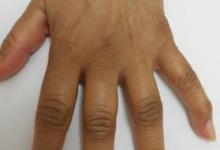Interview Season Save

Rheumatology has become a highly competitive field, attracting the brightest and the best of internists, aspiring to careers in rheumatology. The skills of a rheumatologist include: curiosity, cognitive reasoning, diagnostic acumen, and love for exploration; with a degree of skepticism.
We are at that time of year when rheumatology fellowship programs across the nation are exploring potential candidates to train. During the process, applicants are scheduled to interview with 3 to 5 faculty members who will vet these future trainees. There is no uniformity in questions, no specific guidance on how to determine if a candidate would be a good fit for the program, nor metrics to determine if the match was a good one.
Like most of medicine, finding the best fellows for a program is an art. If the match is poor, both sides lose. Bitterness towards the program and academic inertia could result, and the opportunity is lost to produce a skilled rheumatologist.
Program directors work hard to attract the finest candidate, hoping to shape a future leader; applicants want to impress programs with their experience and desire a place where opportunities are available to explore their potential. So how does a program choose from a large pool of qualified applicants to fill just a few seats? What should applicants look for in a program to ensure a good fit?
Unfortunately, the process has been made more difficult since the pandemic, and applicants cannot visit campuses nor talk to current fellows or candidates candidly in the virtual space. The interview typically lasts 10-15 minutes and feels more like speed dating than an academic interview. Aside from awkward moments and the exchange of niceties, quality candidate – interviewer verbal exchange may be limited to minutes. Assuming no technical errors, these few minutes are valuable, and if utilized effectively, may determine the future of an individual. Albeit imperfect, the process works and can be improved upon.
Below are my tips for an interviewer followed by tips for the candidate.
|
Tips for the Interviewer |
Tips for the Candidate |
|
1. Make the candidates comfortable because they are more likely to open up to you when not stressed. Ask them how their interview day is going and what they have enjoyed thus far. |
1. Be confident; the program would not have invited you unless you have potential. |
|
2. Look over the applicants’ profiles ahead of time. Going in cold to interview a candidate can be awkward and unfair to the applicant. Ask about their training program and what they liked best at that program. |
2. Look into the camera and not at your cat/dog/wall. Body language is everything, and when you are distracted, you appear disinterested. |
|
3. Allow the candidates to speak; this is about them NOT you. Explore their interests. |
3. Make sure your background is appropriate. Dirty laundry and a messy room convey disorganization. |
|
4. Have a few questions prepared. You can ask generic ones: What are you looking for in a program? Why did you choose our program? But, I find that asking more tailored questions based on their application reveals more about the candidate. One candidate spent time in Japan and became fluent in the language as a college student. I asked him what his favorite word is in Japanese. This led to a thoughtful discussion. |
4. If the interviewer asks you a question that you thought you already answered, don’t point it out by saying, “As I previously said…” This makes you sound condescending. Just answer the question again and again if needed. It might be that the interviewer got distracted, or their computer was buffering when you gave the answer. |
|
5. These candidates are competitive; if you want them, sell your program. Tell them why YOU chose rheumatology, why YOU chose your institution, and why they need to as well. |
5. Do your research on who will interview you. The best place to learn more about the interviewer is seeing if they have a social media presence (e.g. Twitter), then their publications, and finally, the program’s website. |
|
6. You may be in a position of power, but allow your candidate to have the last word. Ask them if they have any final questions. |
6. Find out if the program has a mentorship program. Having a mentor makes a big difference toward helping you develop your interests. |
|
7. Keep an eye on the time; it can be embarrassing if you are booted from the virtual meeting room. |
7. Utilize your time to explore the program. If you still have questions, email the program director or the interviewer and thank them for their time. |
If you are a candidate or an interviewer, please contribut your own tips (in the comment section below) that can help others. As rheumatologists, we are a strong community who help one another to advance our field.
Join The Discussion
is there is any program , that i can apply for ?










If you are a health practitioner, you may Login/Register to comment.
Due to the nature of these comment forums, only health practitioners are allowed to comment at this time.